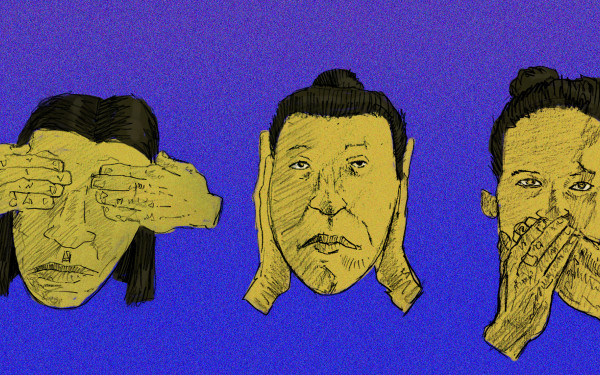How Do We Persist Through a Pandemic?
A Therapist’s Advice on Surviving Social Distancing
As people become more concerned about their loved ones and finances, the COVID-19 pandemic is causing an uptick in anxiety in the general population.
Due to recent university closures and worldwide quarantine requirements, the uneasiness of the moment is turbulent – many students are isolated at home wondering what their futures will look like and this is inevitably affecting their mental health.
According to Dr. Eric Morris, a psychologist based in Notre-Dame-de-Grâce, the pandemic will lead to a rise in depression as people become unemployed or their family members get sick. There could also be a rise in loneliness.
“Substance use and binge-eating rates will likely also rise as people turn to these unhealthy coping mechanisms to reduce anxiety or temporarily improve their mood,” he said.
Morris says the pandemic is increasing these symptoms due to the uncertainty surrounding it. People are unsure not only about their jobs and the health of their families but also about the way the disease is altering the world.
“Every day brings another closure, and our understanding of what daily life entails is in constant flux, which is destabilizing,” Morris said.
He advises people not to think too much about the future and to focus on self-care.
“Let yourself feel whatever emotions arise—don’t judge them. Take on little projects around the house that you have been avoiding so that you have something to work towards. Get outside for a walk each day,” he said.
He also stresses the importance of controlling your news intake to prevent being in a constant state of anxiety. He suggests reading the news once a day—preferably in the morning, so it doesn’t affect your sleep.
His advice to university students, who may be worrying about how the pandemic will affect future events like graduation and final exams, is to focus on staying productive.
“They should focus on what they have control over,” he said. “They should focus on updating their CVs, doing research on companies they could work for once this is over. They should also consider having honest conversations with their families if they worry about their finances, talk to their friends about how they are feeling—they are probably feeling similarly.”
He also focuses on the benefits and pitfalls of social media during this time. Social media is healthy as long as the healthy social networks you keep offline are the same as the ones you keep online, he said.
It’s also important not to use social media as an escape from your emotions, he said. He advises people to try to tolerate their emotions for a few minutes each morning before turning to their devices.
“The better you get at accepting your emotions, the less you will rely on social media,” he said.
He advises people suffering from loneliness to reach out to others as much as possible. It’s important for people to share their own anxieties during this situation.
“Others can’t help us if they don’t know we are struggling,” he said.
One way for depressed people to alleviate their symptoms is to engage in activity. However, this is difficult when they are no longer allowed to go outside and do the things they usually enjoy, such as going out with friends or going to the gym.
Morris highlights the importance of reintroducing hobbies that they may have been enjoyed before, such as knitting, drawing, or learning an instrument. He also suggests people download yoga, strength-training, and stretching apps, make a list of areas in the home that may need cleaning, and learn how to cook new meals.
“They should focus on what they have control over. They should focus on updating their CVs, doing research on companies they could work for once this is over.” —Dr. Eric Morris
Due to the social-distancing requirements, most in-person therapy has now moved online. There are also phone sessions and online therapy services.
All Concordia students can now access Empower Me at 1-844-741-6389. Students can use this service to speak with counsellors about a range of issues, including anxiety and depression. “No issue is too big or too small,” according to its website.
Under the Concordia Student Union health plan, students also have access to the Studentcare Psychology Network under PsyMontréal – where students can be paired with “psychologists who offer their services to students via secure online video conferencing at a preferred rate” according to the CSU’s website.
At this time, a degree of anxiety can be productive as it pushes people to take necessary preventive precautions, like regular handwashing. However, Morris warns against unproductive anxiety, which happens when we catastrophize the situation, such as when we assume someone we know is bound to die from the illness or that a job loss is imminent.
“Try to catch yourself when you make these scary predictions and recognize that that’s all they are—predictions, not facts,” he said. “You also need to recognize that you’re more resilient than you recognize. Whatever you fear, you can get through it and it will pass.”
For people who may not have families or a strong social base to turn to, Morris suggests joining online forums. Reaching out to acquaintances on your social media can also lead to new, vital connections.
Even though this is a time of fear and depression for many, Morris suggests there are ways the experience could still lead to some positive outcomes for people’s mental health in the long run.
For people who have general anxiety, it could put their daily fears into perspective. It could also lead people to feel more grateful for the things they have in their lives, such as family support, their job, or their health.
“People may also recognize that there are more people who care about them than they had realized, due to the outpouring of support at this time,” he said.
Even though people might have fears about depending on the medical system for mental health problems at a time when it is overwhelmed by the pandemic, Morris emphasizes the need for people in crisis not to hesitate to rely on it.
If someone is experiencing psychotic episodes or is suicidal, they should call 911. The Suicide Action Montreal hotline is also available 24/7 at 1-866-277-3553.

_900_600_90.jpg)


_600_375_90_s_c1.jpg)


